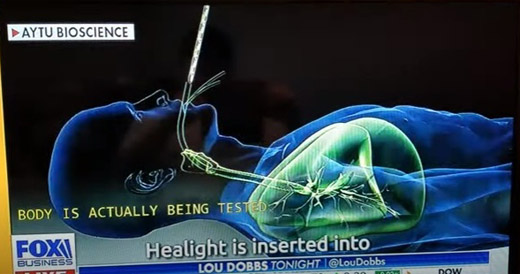by WorldTribune Staff, April 28, 2020
When President Donald Trump suggested last week that ultraviolet light could be effective in killing the coronavirus, he was widely mocked by the corporate media.
But the pharmaceutical firm Aytu BioScience has been researching just such a treatment since well before Trump’s remarks, a report said.
 On April 20, four days before Trump’s remarks on ultraviolet light as a possible coronavirus treatment, Aytu BioScience announced that it has signed a licensing deal with Cedars-Sinai Medical Center in Los Angeles to develop and test a UV-A “Healight” designed to be inserted via a catheter inside the trachea to kill pathogens, including the coronavirus, Rowan Scarborough reported for The Washington Times on April 26.
On April 20, four days before Trump’s remarks on ultraviolet light as a possible coronavirus treatment, Aytu BioScience announced that it has signed a licensing deal with Cedars-Sinai Medical Center in Los Angeles to develop and test a UV-A “Healight” designed to be inserted via a catheter inside the trachea to kill pathogens, including the coronavirus, Rowan Scarborough reported for The Washington Times on April 26.
Aytu BioScience announced on April 27 that it has signed an agreement with Sterling Medical Devices to finalize the development of Healight as a potential treatment for coronavirus.
Aytu BioScience said: “The Healight technology employs proprietary methods of administering intermittent ultraviolet (UV) A light via a novel endotracheal medical device. Pre-clinical findings indicate the technology’s significant impact on eradicating a wide range of viruses and bacteria, inclusive of coronavirus. The data have been the basis of discussions with the FDA for a near-term path to enable human use for the potential treatment of coronavirus in intubated patients in the intensive care unit (ICU).”
In development since 2016, Healight draws on the UV-based treatments for skin diseases like psoriasis, where the rays are used to destroy viral germs, with a UV emitter delivered on a catheter into an intubated patient’s trachea.
Cedars-Sinai says UV-A phototherapy potentially could be employed in internal organs.
At the April 24 White House coronavirus briefing, Trump talked of possible future therapies. William Bryan, acting director of the Department of Homeland Security’s science and technology sector, briefed reporters on how UV light can kill surface viruses.
Trump said: “Question that probably some of you are thinking of if you’re totally into that world, which I find to be very interesting. So supposing we hit the body with a tremendous, whether it’s ultraviolet or just very powerful light. And I think you said that hasn’t been checked but you’re going to test it. And then I said, supposing you brought the light inside the body, which you can do either through the skin or in some other way. And I think you said you’re gonna test that, too.”
The president was roundly mocked for the UV light suggestion.
But, “inserting UV light is exactly what Cedars-Sinai is investigating and is talking to the Food and Drug Administration about securing emergency approval for Healight,” Scarborough noted.
The Aytu BioScience’s statement quoted Dr. Mark Pimentel, who is leading the project: “Our team has shown that administering a specific spectrum of UV-A light can eradicate viruses in infected human cells (including coronavirus) and bacteria in the area while preserving healthy cells.”
Dr. Ali Rezaie, one of the Healight inventors, said: “Our lab at Cedars-Sinai has extensively studied the effects of this unique technology on bacteria and viruses. Based on our findings we believe this therapeutic approach has the potential to significantly impact the high morbidity and mortality of coronavirus-infected patients and patients infected with other respiratory pathogens. We are looking forward to partnering with Aytu BioScience to move this technology forward for the benefit of patients all over the world.”
Aytu Bioscience’s web page states: “The Healight is a catheter embedded with small LED lights that emit UVA light in a specific way.”
The Cedars-Sinai Healight team published an article last year in the United European Gastroenterology Journal, titled “Internally Applied Ultraviolet Light as a Novel Approach for Effective and Safe Anti-Microbial Treatment.”
“These findings suggest that UVA therapy can potentially provide a safe and effective novel approach to antimicrobial treatment via phototherapy on internal organs,” Aytu BioScience says on its website.
Unfiltered UV light is dangerous to humans. But filtering out the harmful UV-C and leaving just UV-A, makes it safe, the company says.
(Update: Despite its partnership with Cedars-Sinai Medical Center and its discussions with the FDA, a video by Aytu BioScience on the Healight technology was removed by YouTube. The Google subsidiary took down the clip for “violating community guidelines” after being flagged by a New York Times reporter. Previously, YouTube said it was going to take down coronavirus content that did not follow the World Health Organization’s guidelines on COVID-19. The video is still available at the Aytu BioScience website.)
Intelligence Brief __________ Replace The Media
